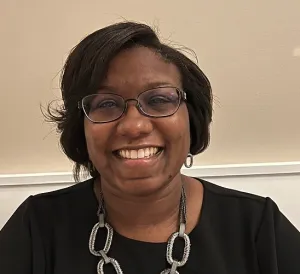Sashir Moore-Sloan teaches American History, World History, Women’s Studies, and AP U.S. History at Charles E. Jordan High School, and has taught in Durham schools for more than twenty years. She is also as an adjunct professor in the History Department at North Carolina Central University (NCCU). This summer, she will be an instructor in the Hank & Billye Suber Aaron Young Scholars Summer Research Institute, teaching the program’s first cohort.
Below, she discusses her path towards education and teaching history in a way that makes all of her students feel seen.
Sashir Moore-Sloan’s love of history began with stories from her grandmother, Dorothy J. Turner. A 1940 graduate of NCCU and one of the first African Americans to vote in Norlina, North Carolina, Turner “had to take a literacy test from a young white man who could not read” and was required to recite parts of the Constitution. “She also used to talk about where the Klan meetings were held, which was very close to where the family lived,” Moore-Sloan recalls.
Originally born in Newark, New Jersey, Moore-Sloan remembers being the third Black family to move into West Orange, a suburb of Newark. She recalls the way neighbors announced they knew exactly what her parents did for a living—her mother, a teacher; her father, a detective. That sense of hypervisibility, combined with a lack of representation in her advanced classes, deepened her desire to amplify overlooked voices.
Those family stories, shared by her grandmother and mother, were a powerful reminder that history is lived, and yet also sometimes hidden. “I always said if I became a teacher I definitely would want to make sure my students feel seen in class, all nationalities, races, everything,” Moore-Sloan says. “Because I think that’s such an essential part.”
Moore-Sloan began her own academic path at NCCU thinking she would become an attorney. She was encouraged to major in history to sharpen her research and writing skills. That decision, she says, opened up a world she’d never imagined. She studied under professors at NCCU who showed her the power of telling Black women’s stories, including professors Dr. Belinda Muhamad and Dr. Lydia Lindsey, with the latter introducing Moore-Sloan to Black Club Women and to the topic of Fannie Barrier Williams for her master’s thesis.
Moore-Sloan now aims to emulate her former professors’ passion in every classroom she enters, whether teaching middle school, high school, or college students. “I proudly proclaim that I’m a history nerd,” she laughs, adding that she tries to make history feel alive, relevant, and connected to her students.
That philosophy makes the Aaron Young Scholars program a natural fit for Moore-Sloan. “I love the fact that this program exists,” she says. “It’s an honor, and I just want to bring that excitement, my love for history, and talking about uplifting people’s voices that are sometimes not heard.” She sees the Aaron Young Scholars program as a way to continue the vital work of confronting uncomfortable truths, telling important stories, and helping students learn how to research and analyze complex questions about society, justice, and inequality.
As she prepares to teach the first cohort of the Aaron Young Scholars program this summer, Moore-Sloan is eager to build on her lifelong mission to teach history that matters. She sees it as far more than a summer program. It’s about giving a new generation of scholars the tools to carry those stories forward. “We all make up history,” she reminds her students, “and we all have a part to play.”

